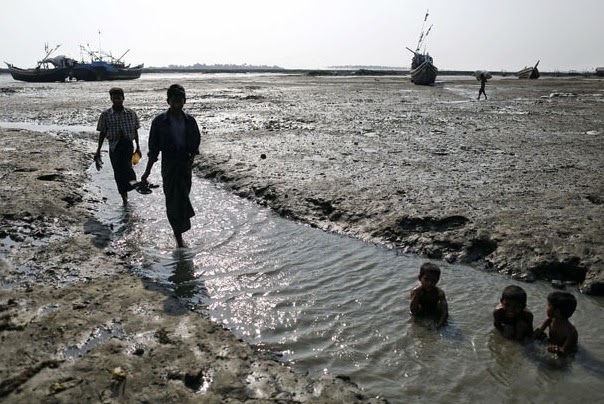More Than 86,000 Have Fled Arakan State by Boat: UN
 |
| Rohingya people walk away from boats near one of many camps for displaced Rohingya on Sittwe’s outskirts. (Photo: Reuters) |
June 12, 2014
RANGOON — The United Nations estimates that more than 86,000 people have attempted the perilous journey to leave western Burma’s Arakan State by boat since the outbreak of inter-communal violence in mid-2012.
The boat people—mostly Muslim Rohingya who are not granted citizenship by the Burmese government—take to the deep waters of the Bay of Bengal, normally in unsafe and overcrowded boats, in hope of reaching another country, usually Malaysia.
According to a transcript posted online, UN Refugee Agency (UNHCR) spokesman Adrian Edwards told a press briefing in Geneva on Tuesday that 615 people were reported to have died making the journey in 2013. The death toll last year compares with 730 people reported dead in the second half of 2012, which Edwards said could be put down to “the use of larger, more stable cargo boats by smuggling networks.”
However, he said, people who successfully made the journey “told UNHCR staff about overcrowded boats that sometimes lost their way or developed engine problems.
“Some ran out of food and water due to the long periods at sea. Some who died on the boats are said to have been thrown overboard.”
Violence between ethnic Arakanese Buddhists and Rohingya broke out in June 2012 and has reignited sporadically ever since. The UN Office for the Coordination of Humanitarian Affairs’ most recent figures say 137,000 people are living in camps for the internally displaced in the state, the majority of whom are Rohingya.
With tensions still high in the state, and limited access to humanitarian assistance, health care, education and work, many appear willing to take the risk of leaving by sea.
“The UNHCR estimates more than 86,000 people have left on boats since June 2012. This includes more than 16,000 people in the second half of 2012, 55,000 in 2013 and nearly 15,000 from January to April this year,” Edwards said. “The majority are Rohingya, although anecdotally the proportion of Bangladeshis has grown this year.”
Edwards also outlined the problems faced by boat people at their destinations. In southern Thailand and increasingly in northern Malaysia as well, many fall into the hands of human traffickers.
“There they were kept for months in overcrowded camps and sometimes even in cages until their families could pay for their release,” Edwards said, adding that detainees were beaten, subjected to harsh conditions and fed meager rations in the camps in the jungles of the Thai-Malaysian border.




.jpg)








